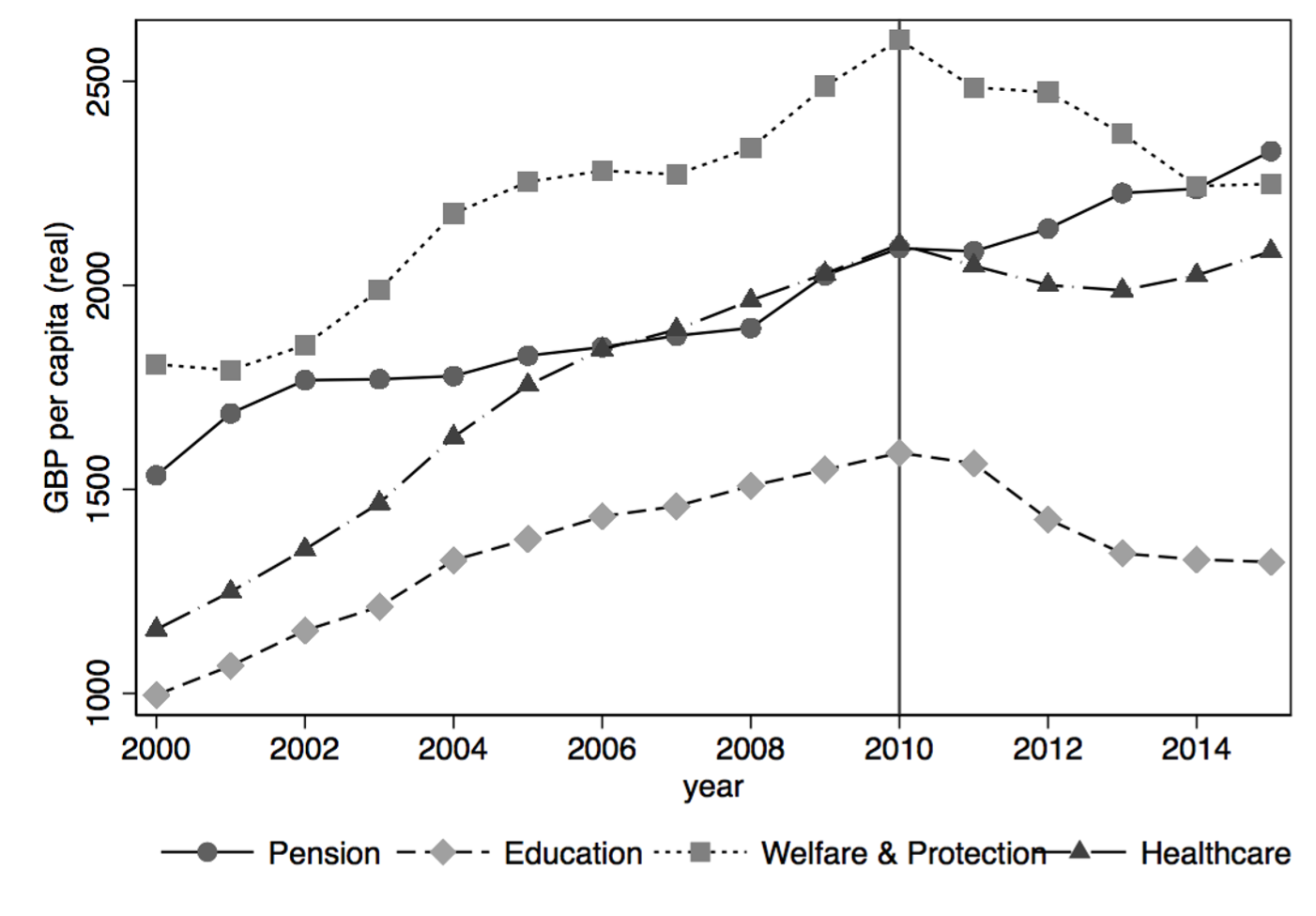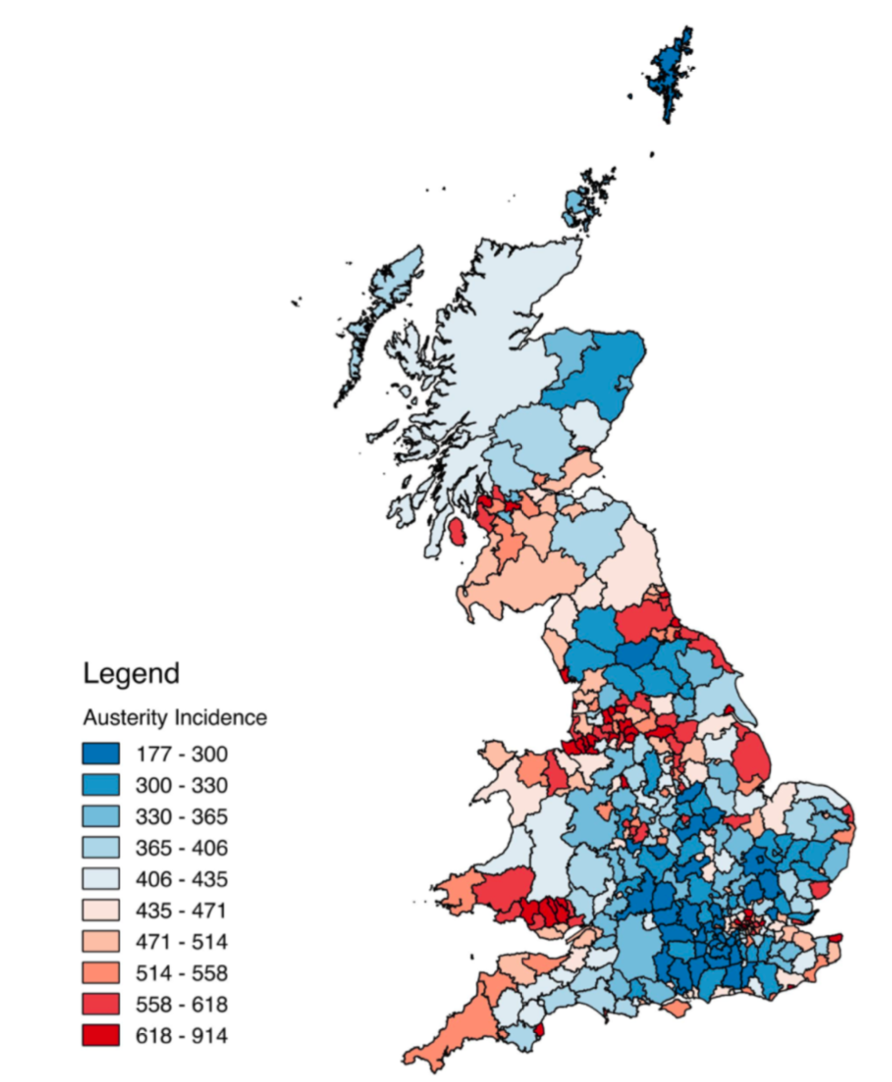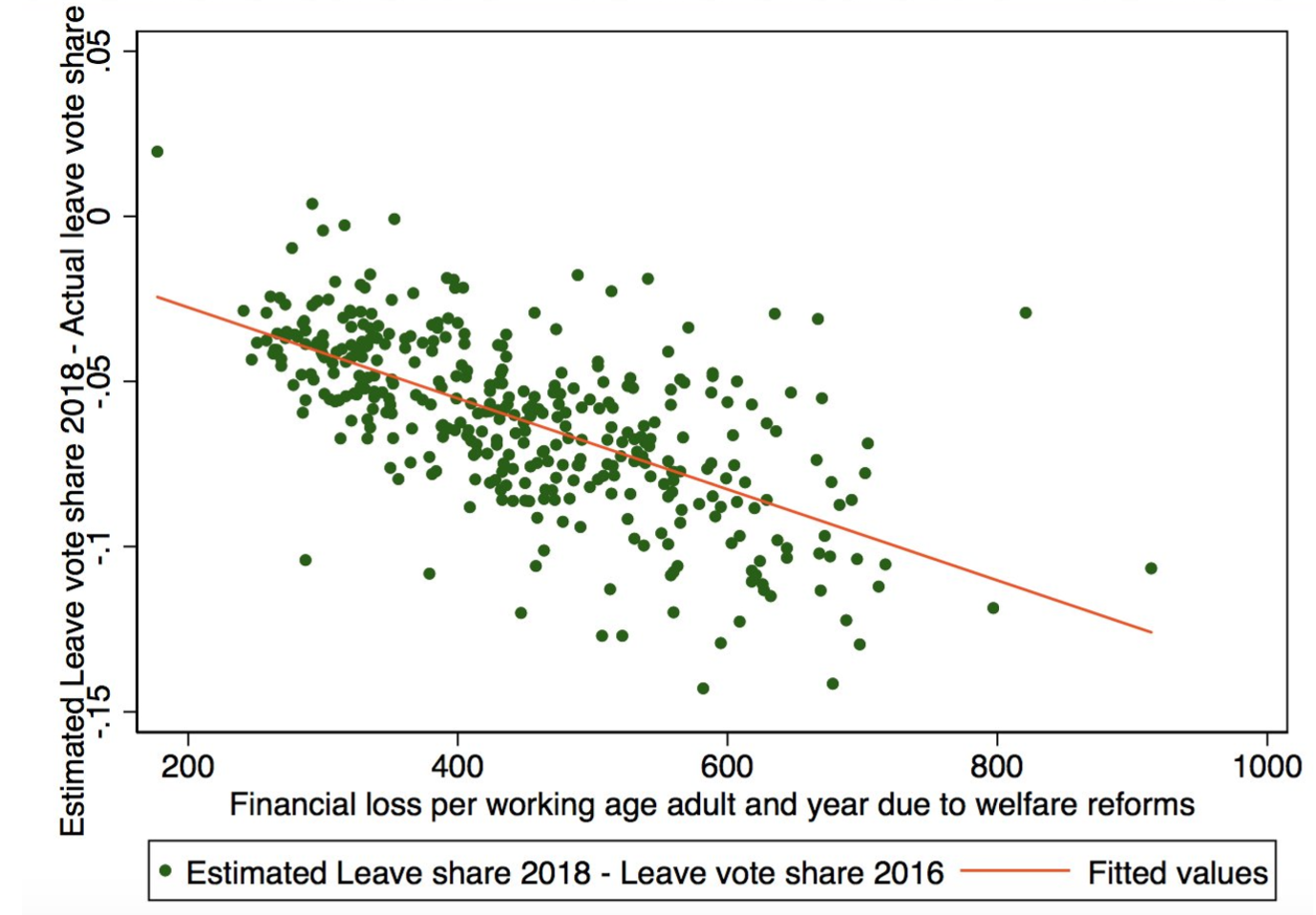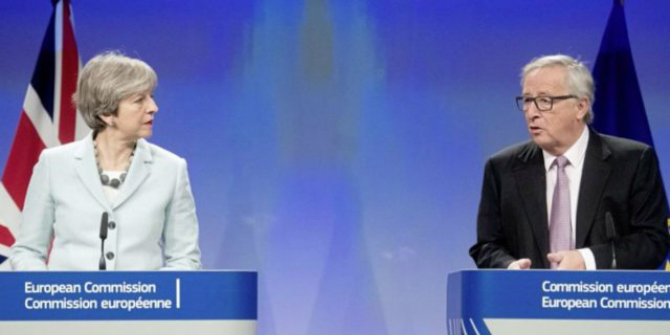 The voters most badly hit by austerity cuts were those drawn to UKIP and who supported Leave in the EU referendum, argues Thiemo Fetzer (University of Warwick). Recent polling evidence suggests that it is these same voters who are now changing their minds about Brexit.
The voters most badly hit by austerity cuts were those drawn to UKIP and who supported Leave in the EU referendum, argues Thiemo Fetzer (University of Warwick). Recent polling evidence suggests that it is these same voters who are now changing their minds about Brexit.
Jeremy Corbyn, when asked in a recent interview whether he would stop Brexit if he could, said: “We can’t stop it. The referendum took place. Article 50 has been triggered. What we can do is recognise the reasons why people voted Leave.” A lot of research in the social sciences since the 2016 EU referendum have attempted to do just that: understand why a small majority of the electorate that turned out voted to Leave.
This literature suggests that leave supporting areas (and leave voters) clearly stand out by being more deprived, having lower levels of income and life satisfaction, less access to high status-jobs, and living in areas with overall weaker economic structure, an ageing demographic and lower levels of educational attainment (see for example here, here, here or here). The big caveat with most of this work is that it is purely descriptive at best, without actually providing insights into the causal factors that induced voters to vote the way they did.

In a recent paper I argue that austerity and welfare reforms are among those factors that causally explain why voters shifted to support Leave to cast a protest vote. Crucially, the critical mass of voters that tipped the referendum in favour of Leave did not do so out of an ideological opposition to the UK’s EU membership, but as a protest against the status quo. Evidence from a recent survey indicates that it is those very same voters who are now having a change of heart.
The role of austerity
Areas with poor economic and social fundamentals voted to Leave. Austerity and the ensuing welfare reforms since 2010 hit those areas the hardest.
At the level of local authority districts, spending per person fell by about 23% in real terms between 2010 and 2015, and the poorest areas were hit the hardest, with drops in local authority spending in some areas reaching up to 46% (Innes and Tetlow, 2015). In 2013, it was estimated that many of the measures included in the Welfare Reform Act of 2012 would cost every working-age Briton, on average, around £440 per year.
Aggregate figures suggest that overall government spending for welfare and protection contracted by 16% in real per capita terms (see Figure 1 below). While the NHS was ringfenced from direct cuts, the rapidly ageing population implied significant increases in demand for healthcare, worsening the quality and access for many and contributing to the now regular winter crises.
Figure 1 – Overall public sector spending in GBP per capita (real). Data are from HMRC and ONS.
 The impact of the cuts was far from uniform across the UK, as is visualised in Figure 2: it varied from around £914 in Blackpool to just above £177 in the City of London.
The impact of the cuts was far from uniform across the UK, as is visualised in Figure 2: it varied from around £914 in Blackpool to just above £177 in the City of London.
Various econometric techniques allow the analysis of how exposure to austerity is tightly linked with increasing support for UKIP – the strongest single correlate of support for Leave in 2016 – studying data across all electoral contests held in the UK since 2000. The austerity-induced increase in support for UKIP is sizable and suggests that the referendum could well have gone the other way had it not been for austerity. Estimates suggest that, in districts that received the average austerity shock, UKIP vote shares were on average 3.58 percentage points higher in the 2014 European elections and 11.62 percentage points higher in the most recent local elections prior to the referendum, compared to districts with little exposure to austerity.
Figure 2 Distribution of austerity shock simulated by Beatty and Fothergill (2013) and used in Fetzer (2018). The measure is expressed in financial losses per working-age adult per year.
The tight link between UKIP vote shares and an area’s support for Leave implies that Leave support in 2016 could have been up to 9.51 percentage points lower and, thus, could have swung the referendum in favour of Remain had the austerity shock not happened.
Austerity-induced welfare reforms and individual attitudes towards the political system
Individual-level data on political preferences and attitudes towards the political system overcome some of the main concerns that may be raised when studying election data, and further allow a sharper identification of the underlying causal mechanisms.
Using data from the UK’s largest and most comprehensive household panel study covering around 45,000 households, I show that individuals exposed to various welfare cuts saw a market increase in support for UKIP, for Leave (which is measured in the study) and wider anti-establishment political preferences.
For example, one of the welfare-reform measures was the so-called “bedroom tax”, which implied reductions to housing benefit for households living in social-rented housing judged to live in too large accommodation relative to their needs, having an excess bedroom. The results suggest that households exposed to the bedroom tax increasingly shifted towards supporting UKIP, experienced economic grievances as they fell behind with their rent payments due to the cut to housing benefits, and some, avoided the benefit cut by moving to less spacious housing (see Figure 3).
As a result, many individuals exposed to these welfare reforms started to feel disenfranchised. Among the austerity-hit voters, the share that perceive that “public officials do not care”, that they are “not having a say in what the government does” and that their vote is “unlikely to make a difference” increases sharply, suggesting a wider increase in protest and dissatisfaction beyond what can be captured by support for UKIP. Not surprisingly, these very same factors are tightly associated with support for Leave.
A change of heart?
The evidence suggests that a significant share of Leave voters supported Leave not because they were ideologically opposed to the UK’s EU membership, but rather that they saw that as an opportunity to voice their grievances and dissatisfaction with the status quo. Those same voters are most susceptible to swing back to supporting Remain.
And this appears to be happening – while Leave support was strongly driven by austerity-hit areas, those places now disproportionately have a change of heart. A new Survation Opinion poll sampling more than 20,000 individuals across the UK allows the construction of quite precisely estimated measures of support for Leave in 2018 – and thus, allows for a direct comparison between the support for Leave in 2016 vis-à-vis today.
The contrast is quite stark – those areas most exposed to welfare reforms, and which saw a decided swing towards Leave in 2016, see among the largest drops in support for Leave in 2018. This suggests that the pivotal voters that contributed so crucially to the Leave victory are now having a significant change of heart. The question is whether politicians will take their views on board.
This post represents the views of the author and not those of the Brexit blog, nor the LSE.
Thiemo Fetzer is an Associate Professor in the economics department of the University of Warwick. He is also affiliated with the Centre for Competitive Advantage in the Global Economy (CAGE) at University of Warwick and the Spatial Economics Research Centre (SERC) at London School of Economics, the Households in Conflict Network and the Pearson Institute at University of Chicago.











No one has changed their mind.
“Overall public opinion has drifted slightly against Brexit. We regularly ask the public whether they think that Britain was right or wrong to vote to leave and the answers now show that slightly more people think it was the wrong decision. The gap is still relatively small (on average this year “wrong” has had a three-point lead over “right”), but it is consistent.”
https://yougov.co.uk/topics/politics/articles-reports/2018/09/12/how-public-feel-about-brexit-options
But – looking at your data to 05/11/18 – it averages 4.875% since the beginning of July (Chequers time). So the gap appears to be following a slowly widening trend.
So despite the intensive campaigning by Remain over more than two years, opinion has drifted only slightly. During that time Leave haven’t seriously tried to argue their case since they do not wish to budge from the position that the vote was final and therefore not open to discussion. It seems to me that if a second referendum were called then Leave could easily turn things around during the campaign period, particularly when people are faced with the reality of staying in the EU in a subservient position with all the previous leverage forfeited.
An interesting point is that there are some people who voted Remain and who feel that they could not in principle vote against the previous outcome. Does the You Gov poll capture these people correctly I wonder, or are they recorded as people who voted Remain and don’t regret it?
Perhaps the question people should be asked is “Could you stand another round of Referendum campaigning and are you prepared for another bout of bitterness if the result again comes out close?”
“It seems to me that if a second referendum were called then Leave could easily turn things around during the campaign period […]”
Leave (in its simplest form) is unlikely to be on the ballot paper because we now have the proposed method of how we would leave. Therefore, the question is likely to be along the following lines:
Should the United Kingdom accept the proposed withdrawal agreement or remain a member of the European Union?
Nope.
If Remain is on the ballot paper then there is no reason why Hard Brexit shouldn’t be also.
If you don’t want to risk a hard Brexit don’t push for a referendum.
Another referendum needs months to arrange.
The EU27 would not agree to an extension under Art 50(3) if “hard Brexit” was on the ballot paper.
“The EU27 would not agree to an extension under Art 50(3) if “hard Brexit” was on the ballot paper.”
A second referendum based on terms dictated by the EU would not be politically acceptable. Even moderate supporters of Remain in parliament would baulk at the idea that there should be a new referendum on British Sovereignty but based upon terms dictated by a third party. It is doubtful that the Electoral Commision would allow a ballot paper which omitted an option that would be supported by a substantial part of the electorate and if they did it would be challenged in court. In any case a referendum which restricted democracy to that extent would met by civil unrest and it would suffer the same fate as the poll tax.
The hypocrisy of the Remain camp never fails to amaze me. “Let’s have a people’s vote but don’t allow them the options we don’t like or they may get it wrong.”
What utter nonsense, people voted leave for a number of reasons, not least of all immigration and the impact it has on jobs / pay rates GP services, public transport, school places accommodation and so on.
.
All of the stated reasons are down to OUR government, not the EU. The Tories have been responsible for the cuts to GPservices, transport, education etc.
Yes, that is true. While the EU has little or nothing to do with the things that people were unhappy with, their feelings towards the EU played a big role. These feelings, that Brussels controls everything we do and that we get nothing in return, have been fuelled by constant negativity about the EU in the press and parliament.
The EU is a convenient scapegoat for the Tories right now as if they didn’t have Brexit to occupy the public’s minds with, we’d be outraged at what they have done to public services.
The Migration Advisory Committee concluded that the impact of immigration on jobs / pay rates GP services, public transport, school places accommodation and so on is POSITIVE.
I’m sure it did but did it say in what possible way it was positive?
also, did it include all the immigrants who are net drain on society?
Yes and it is pure coincidence that wages are at last rising in real terms now that the level of net immigration is tailing off.
Most commentaries mention the net increase in tax revenue, but EU migrants generally come here to work in professions with staff shortages, and those that reduce the strain on public services, such as in the NHS. This report mentions the MAC assessment, although I can’t find the specific report Alexis refers to. But these benefits are well known, it’s simple arithmetic.
https://www.independent.co.uk/news/uk/politics/eu-workers-uk-tax-treasury-brexit-migrants-british-citizens-a8542506.html
The phrase ‘lies, damned lies and statistics springs to mind’ and this really is clutching at statistical straws.
What is remarkable is the extent to which, even in opinion polls (which have consistently underestimated the Brexit vote), the desire to leave has held up, despite the well-orchestrated and well-publicised mess the largely remainer government and overwhelmingly remainer civil service is making of its implementation.
What is certain is that the failure to implement Brexit would make it clear once and for all that there is no point in voting. Democratic decisions have to be implemented to be meaningful and if they are not, democracy is dead. Whatever the economic implications or perceptions of austerity may be, the failure to leave the EU would represent a crisis of governance we have not seen since Charles I entered the House of Commons to arrest the ‘Five Members’ in 1642.
What do you mean “the largely remainer government”!?
When Theresa May became PM she appointed devout brexiteers to implement Brexit. In two years they achieved very little if anything. They had their chance and failed. Are we then meant to go into North Korea mode and keep chanting the same slogans even though they are now empty of all meaning?
“The evidence suggests that a significant share of Leave voters supported Leave not because they were ideologically opposed to the UK’s EU membership, but rather that they saw that as an opportunity to voice their grievances and dissatisfaction with the status quo.”
Or conversely one could say that the evidence shows that a significant share of Remain voters supported Remain not because they were ideologically in favour of the UK’s EU membership but because they were doing alright and didn’t want anything to upset their comfortable living.
I would fit your bill of someone who is a comfortably off Remainer. The fact that I am comfortably off and well qualified and experienced actually means I am much better positioned than many to weather the economic storms of Brexit. It is people in economically deprived areas who work for employers like Nissan with integrated EU supply chains and markets who have most to fear from Brexit. There will be a civil service job bonanza for the middle classes as result of Brexit. All the regulatory functions that are shared with the rest of the EU will now have to be replicated by UK bodies at great expense now. Meanwhile, the need for migrants to staff the UK health and social care and hospitality and construction sectors will not end after Brexit. Many who voted for it will instead see their own jobs disappearing while immigration continues unabated. The only real winners from Brexit will be the very rich people who put the money for convincing the public that immigrants and the EU were the source of their problems. Leavers should ask themselves why people who move their businesses and their money to foreign countries and who take up foreign passports for their family really have their best interests at heart.
“a significant share of Remain voters supported Remain not because they were ideologically in favour of the UK’s EU membership but because they were doing alright and didn’t want anything to upset their comfortable living”
This seems like a perfectly reasonable motive for voting remain.
On the other hand. voting leave to signal dissatisfaction with the economic status quo is a bad decision.because Brexit will in all likelihood make their economic situation worse.
We are where we are because the choice was binary and one side could spin any number of falsehoods. The other side could not counter except with fear of the unknown. Now the unknown is clearer the choice should similarly be binary. take what is on offer of stay.
The hypocrisy of some Remain supporters is breathtaking!
I demand a Peoples Vote! … but this time we must restrict their choices so they don’t get it wrong again!
I agree with many of the claims made here, but not that it was a protest vote. Many of those in poorer constituencies will have had a poor view of the EU – not based on evidence, but because they’ve received the message over the last 40 years or so in the media that the EU is the cause of all their woes. Combined with fears over immigration and the “taking back control” rhetoric, these voters thought their problems would be alleviated by voting to Leave – even though objectively that is not true.
If they who voted Leave are getting confused by the relentless barrage of mis-information and lies, constructive lies and confabulations emanating from the government, the EU and most of the MSM and the MPs who are putting on a theatrical performance to disable people’s rational faculties, then they have not a strong enough mind of their own to defend and hold on to their own opinion. The same applies to Remainers who, in good faith or otherwise, voted Remain and are not waking up to the mendacity of the political games being played by the Establishment. People still have a choice in the UK. Defend parliamentary democracy or make an absolute mockery of parliamentary democracy and see what ensues. Looking at the wider world, and looking at the EU methods, and looking at the utter falsity of the UK Establishment, for people of whatever political persuasion to put up with this charadery in any way, even to a minor extent whatever, bodes ill indeed.
“People still have a choice in the UK. Defend parliamentary democracy or make an absolute mockery of parliamentary democracy and see what ensues.”
Moving on a few weeks, Jacob, from when you wrote this; the people defending parliamentary democracy in the UK seem to be the ones challenging in the High Court the legal validity of the 2016 referendum and the decisions taken subsequently by the UK government and the ones making an absolute mockery of it seem to be those who treated the legal requirements surrounding the referendum with careless and jocular contempt.
I don’t know about you, Jacob; but I certainly do not believe that partisan fervour (even if dressed up as patriotism) should trump the rule of law.
“Combined with fears over immigration and the “taking back control” rhetoric, these voters thought their problems would be alleviated by voting to Leave – even though objectively that is not true.”
Those poor dumb Leave voters they know so much less about their own lives and their individual circumstances than you do!
It is to the credit of Leave supporters that they don’t try to argue their case by attributing stupidity to others or by patronising them.
I’m from a Leave-voting area. The arguments against the EU are not based in reality, but identity. The EU has nothing to do with the things they are unhappy about, but they connect not being in the EU with a time when the UK was supposedly better. They are going to be very disappointed if/when we leave.
And if you object to anything I’ve said, perhaps you could address the point instead of accusing me of patronising others, when I can see with my own eyes the utter nonsense being spouted about the EU by ordinary people. I’m not going to coddle the feelings of people who are wrong – but then the fact that feelings come into this so much is half the problem.
I live in Kent, a Leave voting area and one of the things which people are fed up with is the pressure of housing and the resulting traffic congestion. Guess what? Maidstone council has recently announced that it now planning on the assumption that it will receive lower housing targets from central Government than it was previously anticipating. It says that this is because the ONS has lowered its future population estimates based on the decreased immigration since the referendum vote. So, people in this area can already see a positive benefit from voting Leave.
I’m from Kent, and I am aware of all sorts of misconceptions about immigration causing this, that and the other. We both know that the people who can afford to live in Maidstone are likely to be wealthy, white and British – people who already live in the UK:
http://localstats.co.uk/census-demographics/england/south-east/maidstone
Post-Brexit population estimates aren’t necessarily accurate – something that the ONS says here: https://www.ons.gov.uk/peoplepopulationandcommunity/populationandmigration/populationprojections/compendium/nationalpopulationprojections/2016basedprojections/frequentlyaskedquestions#do-the-assumptions-take-brexit-into-account
“8. Do the assumptions take Brexit into account?
These are projections, not forecasts. This means we do not attempt to predict the impact of future political or economic changes, not least because it is very difficult to be sure of even the broad demographic impact.
In simple terms, therefore, we do not take Brexit into account. However, because the shorter-term international migration assumptions use the very latest demographic information, they do reflect the decline in net international migration that has occurred since the Brexit vote in June 2016.”
So if the council is using these projections for planning and budgeting, it will only be at a high level, and these figures can’t be relied on. The council know this. I would suggest that the desirability of the area, local opportunities and private sector investment in new housing would be better indicators of future growth.
If we’re just talking about housing, though, the UK has a surplus. It is because of unequal wealth distribution, and local councils relying on overseas investment that central government will not provide, that we have thousands of homes standing empty.
As well as that, we have an ageing population and a low birth rate. Some immigration is necessary, and the UK has far lower levels than other European countries. The reason that Maidstone needs more housing is because people want to live there. The reason public services are overstretched is because the Conservative government has broken them up, asset-stripped them, and cut funding. It is nothing to do with immigration.
Housing is not only a lighting rod for the Leavers, or just a symptom of the EU policies, but actually one of the mechanisms by which the citizens of EU member countries are being displaced. I heard recently about a village in Holland that an entire new housing development was earmarked for illegal migrants ( asylum seekers). There was an outcry from the local residents still living with their parents who were on the waiting list to rent or buy locally. As is the case in Holland, the private sector rents are unaffordable for most people. The upshot was that half the new development was given over to locals waiting to get to rent a place of their own. The message is clear, however, that illegal migrants still get looked after before the legal citizens most of whom would be born in Holland of autochtonomous parents. There appears to be a definite policy in Holland, at least, to favour newcomers and their offspring over the indigenous population. How many more wish to come when they get it easy like that. I’ve never lived in a place of my own, have not been on a benefit for 45 years, until I got a part pension recently., but how many from outside the EU, which is what we use to call illegal migrants, can EU member countries accommodate?
“We both know that the people who can afford to live in Maidstone are likely to be wealthy”
No we don’t. I know more about me and my life than you do, so don’t be patronising. I know people who are buying houses in the Maidstone area and many of them are not wealthy. Furthermore many are only buying houses in Maidstone because they can’t afford to live nearer to London or in Sevenoaks or Tunbridge Wells or where ever they work and have family. My wife was talking last week to a couple who had moved from Tonbridge to our village to be near their daughter. Their daughter couldn’t afford to live in Tonbridge. You are wrong to say that the reason Maidstone needs more housing is because people want to live there. Many people want to live somewhere else but they can’t afford to. They move to Maidstone because houses are being built there at a rate which is contrary to the wishes and needs of local people. (Even if Maidstone did need more housing because people want to live there. Immigrants are people. So that reinforces my view.)
Maidstone is mainly British because before Free Movement mainly British people lived there and they haven’t gone away. My impression is that Maidstone is a centre of attraction for European immigrants. My experience is that I am more likely to be served by a European in Maidstone than in many other Kent towns. Reports in the local paper often refer to individuals who are European immigrants. As for Maidstone being mainly white people, European immigration has little to do with skin colour. Perhaps someone could explain that to Vince Cable.
As for the more general point, European immigrants live in houses not in fairyland, They increase the demand for housing.
“I would suggest that the desirability of the area, local opportunities and private sector investment in new housing would be better indicators of future growth.”
Talking of misconceptions, which you were, you don’t understand how housing targets are set . Housing targets are set by central government and are bitterly resented. Local factors have little to do with it. Much of it is to do with London overspill. Hence housing targets tend to be set in proportion to perceived national population growth irrespective of local needs.
“8. Do the assumptions take Brexit into account?
These are projections, not forecasts. This means we do not attempt to predict the impact of future political or economic changes, not least because it is very difficult to be sure of even the broad demographic impact.
In simple terms, therefore, we do not take Brexit into account. However, because the shorter-term international migration assumptions use the very latest demographic information, they do reflect the decline in net international migration that has occurred since the Brexit vote in June 2016.”
So what the ONS is saying is that if Leavers have their way the projections could be lower but if Remainers get their way they could be higher, in the meantime immigration has declined since the 2016 vote so we are working on that basis.
Project fear is visibly turning into actual, rational fear – see how few even in parliament (all who latterly “supported Brexit”) seem ready to vote for “no deal”. Rees-Mugg seems to have gone quiet now his army of MP followers seem to have melted back into conformity with reality
Jesus, if people hated austerity, then they should’ve voted for Labour, not UKIP. Maybe it wouldn’t make too much difference in the short run, but if the Tories keep getting handed one defeat after another, they’d be forced to slowly abandon austerity.